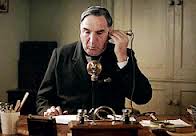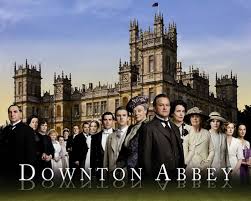"Lessons from Downton Abbey"
by Cantor Shoshana Brown
Published in the Herald News on January 10, 2014
2014 has begun-by now, you may have already seen the first installment of Season 4 of Downton Abbey, whose story begins roughly a century before ours, with the sinking of the Titanic in 1912. My husband (the rabbi) and I recently acquired a boxed set of DVDs covering the first three seasons. While I have been a veteran fan of Downton, my husband has not, and so I have been enjoying watching him become caught up, and delighting in his newfound enthusiasm for the series, its writing, acting, the scenery and clothing, and the development of the characters of all the main players over time. But I have been asking myself: what else is there to Downton Abbey that makes it so compelling?
The time period in which Downton’s story takes place shares some important features with our own. Although organized religion does not play a central role in Downton’s plot twists (so far), nevertheless the features its era shares with ours are of great import to religious institutions today. The early 1900’s were years of rapid technological advances, witnessing Western society on the precipice of enormous social change. We laugh as we watch Carson the butler practice answering the Abbey’s first telephone, and the dowager Countess shade her eyes upon first encounter with the estate’s newly-installed electric lights. But the social changes that accompany these technological ones are even more radical: the beginning of the struggle for women’s rights, the early cracks in the walls that had divided the British social classes for centuries; the rise of nation-states against colonial powers…it was a time of mass upheaval, a devastating war in Europe, and a subsequent refugee crisis.
In our own day some of us over a certain age feel as bewildered as the Abbey’s butler at the rapid pace of innovation. It used to be that the cantor’s primary role in the synagogue was to sing-nowadays it might be expected of a cantor to tweet as well! (I do not know how…in fact, I do not even text!) “Brick and mortar” institutions are outmoded today for many members of the young adult generation-and we of the older generations who still attend services in our various places of worship miss them! What will become of the edifices that our forbears toiled to erect, of our faiths’ liturgies, our worship traditions…more importantly, of the special kind of community that coalesces when people sing, pray, study sacred texts, share sacred meals, and embark together on faith-inspired tasks to try to bring the world a little closer to “redemption”? While it is true that great gatherings such as the various “Occupy” encampments and the Egyptian revolution on Tahrir Square came about by means of Facebook, Twitter, etc., nevertheless these movements share a kind of “Brigadoon” quality, here today and gone tomorrow; alliances are easily made and easily forgotten. How can a person have thousands, or even hundreds, of actual “friends”? What does it mean when 50 people wish me “Happy Birthday” on Facebook but would never call me to invite me out to coffee?
Like the characters in Downton Abbey, I do not know where it is all leading. Certainly our latest technological innovations can be used for good-saving lives and empowering people in ways that no one could have dreamt of a century ago. But as a religious leader, I am concerned about the loss of face-to-face gatherings which involve long-term commitment, and which we used to call “community.” A kind of magic can happen when people sing , share a meal together, bow their heads together in the same physical space over a long period of time. Downton Abbey shows a kind of “community” which takes place on one estate, involving a large social spectrum of people, from elderly to newborns-and we marvel as they share their travails together, mature in wisdom and kindness over time, and help one another meet the challenges of the new era. Here in Fall River, I know that I am by no means alone, as a clergyperson, in praying for the wisdom necessary to meet the challenges of our own “new era.” Whatever surprises the future brings, I also pray that we not lose the talent for real encounters, true friendships, and the strength that comes from actual community, which, since we have no grand manor houses to meet in, may be found in our synagogues and churches. No formal attire required!
Cantor Shoshana Brown is the co-spiritual leader, and musical director, of the Jewish congregation, Temple Beth El, of Fall River.





